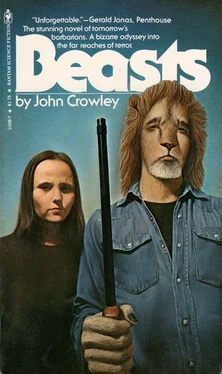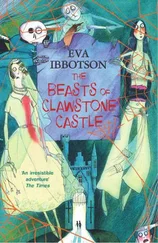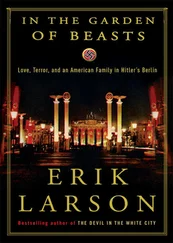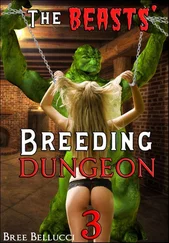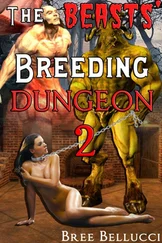“Brandy. Don’t you know?”
He put it down without interest.
“You were going to meet your somebody here.”
“We’ll wait. He’ll come. If he can.” The decision made, he ceased his prowling. The fire, a bottled-gas thing, boomed when she touched a match to it, and glowed blue. Why, she wondered, bottled gas in the middle of the woods? And realized: for the same reason that this place looks bike a shack.
Bottled gas makes no smoke. No smoke, nobody home.
“Where are we?”
“A place.”
“Tell me.”
The heat of the fire had seemed to soften him. He sat on the small sofa before it, begs wide apart, arms thrown across its back. On a sudden impulse she knelt before him and began to unlace his boots. He moved his feet to aid her, but made no remark on this; accepted it, as he did everything she did for him. “Tell me,” she said again, almost coyly this time, looking up at his big head resting on his chest. She smiled at him and felt a dizzy sense of daring.
“We are,” he said slowly, “where a certain counselor, a government counselor, comes, sometimes, when he wants to get away say from the office or town, and where he might come if he had to get away from the government. And we’ll meet him here. If we’re lucky.”
It was the longest speech she had ever heard him make. Without hurry she took off his boot and rolled the sweat-damp sock from his long, neat foot.
“What then?” she said, more to hear him talk than because she cared or understood; anyway, the blood sounding in her ears made it hard to think.
“This counselor,” he said lazily, seeming not to care either, watching her unlace the stiff thongs of the other boot, “this counselor is a friend of ours. Of our kind. And his government wasn’t. And his government down there has just collapsed, which you may or may not know, partly because he” — she drew off the other boot — undid it, you could say, and so he’s had to leave. In a hurry.”
“Want some?” she said, showing him the brandy bottle.
“I don’t know,” he said simply. He watched her as she went around the room, finding glasses, breaking the bottle’s seal; watched her, she knew, differently now. She felt a fierce elation, having embarked on this thing; felt the danger bike the sear of the brandy. “Warm,” she said, putting the glass in his hands, touching his fingers lightly. He raised the glass to his face and withdrew it quickly, as though it had bitten him; his nostrils flared and he put it down.
“How come—” she had not sat but walked now before him, holding her glass in two hands, past him and back again — “how come you don’t have a tail?”
“Tails,” he said, watching hen, “are for four-begs. I’m a two-legs.” His voice had darkened, thickened. “Couldn’t sit down, with a tail. A piece of luck.”
“I’d bike a tail,” she said. “A long, smooth tail to move…” She moved it. He moved. She moved away, a sudden voice urgent in her ears: you can’t do this you can’t do this you can’t do it you can’t .
He rose. The way he did it made it seem as though he was doing it for the first time after aeons of repose, the way movement gathered in his muscles to lift his heavy weight, the way his hands took hold of the couch to help him up; it was like watching something inanimate come frighteningly, purposefully alive in a dream. As he stood, his eyes somehow caught the fire’s bight and the pupils glowed brilliant red.
She was in a corner, holding hen glass before her breasts protectively, her daring gone. “Wait,” she said, on tried to say, but it was a sound only, and he had hen: it was useless to struggle because he was helpless. She was swallowed up in his strength but he was helpless, taking her because he no longer had a choice: and she had done that to him. An enormous odor came from him, dense as an attar, mingling with the smell of spilled brandy; she could hear his quick breath close to her ear, and her trembling hand fumbled with his at her belt. Her heart was mad, and another voice, shrill, drowned out the first: you’re going to do it you’re going to do it you’re going to .
“Yes,” she said. She yanked at her belt. A button tore. “Yes.”
She had thought that a single act of surrender was all she needed to make, that having made it she would be deprived of all will, all consciousness by passion, and that whatever acts followed would follow automatically. Her heat hadn’t imagined difficulties; her heat had only imagined some swift, ineluctable coupling, bike contrary winds mixing in a storm. It wasn’t like that. He wasn’t a man; they didn’t fit smoothly together. It was like labor; bike battles.
And yet she did find the ways, poised at times between repugnance and elation, to bare herself to him; drowned at times, suffocated at times in him as though he plunged her head under water; afraid at times that he might casually, thoughtlessly kill her; able to marvel, sometimes, as though she were another, at what they did, feeling, as though through another’s skin, the coarse hair of his arms and legs, thick enough almost to take handfuls of. For every conjunction they achieved, there were layers of shame to be fought through like the layers of their thick clothing: and only by shameless strategies. only by act after strenuous act of acquiescence, her voice hoarse from exertion and her body slick with sweat, did she conquer them: and entered new cities, panting, naked, amazed.
She began to sob then, not knowing why; her legs, nerveless, folded under his careless weight. She lay against his thick thigh, which trembled as though he had run a mile. She coughed out sobs, sobs like the sobs of someone who has survived a great calamity: been shipwrecked, suffered, seen death, but against all odds, with no hope, has survived, has found a shore.
She dreamed, toward dawn, curled against him, of muscle; of the tensed legs of his wives bearing him, of the fine bones and muscles of his hands, of hen own slim arms wrapped in his, struggling with his. The soreness of hen own muscles entered her dream, hen own sinews tightening and slackening. She dreamed: I did it I did it I did it . She awoke exulting then for a moment and curled herself tighter against his deathlike sleep. She dreamed of his punning dreaming breath; it grew huge and menacing, and she awoke to the fast tick of the searching helicopter growing quickly closer. She moved to awake him, but he was awake already; all his senses pointed toward the growing sound. It became a roar, and its wind stirred in the cabin. It had landed outside.
He had a hand on her that she knew meant keep still. He turned, crouched and silent, toward the door, which was locked. Feet came across the pine needles toward the door with a sound they wouldn’t have heard if they weren’t all attention. Someone tried the door, paused, knocked, waited, pounded impatiently, waited again, then kicked in the door with a sudden crack. For a moment she could see a man silhouetted against the morning, could see him hesitate, looking into the shuttered gloom of the cabin, could see the gun in his hands. Then Painter, beside her, exploded.
She didn’t see Painter move, nor did the one at the door, but there was a cry from his throat and a flurry of motion and he had seized the intruder, who made one sound, a sound Caddie would never forget — the desperate, shocked shriek of seized prey — and Painter had locked the man’s head between his forearms. The man sank suddenly, as though punctured, his head loose on his body.
Painter, legs wide apart, supported him roughly — worried him, she would think later, bike a cat, turning him this way and that to see if there was any life left in him — and then dropped him. “Sunless bastard,” he said, or she thought he said. Beyond, in the tiny clearing, the copter’s blades notated lazily, not quite done.
Читать дальше
